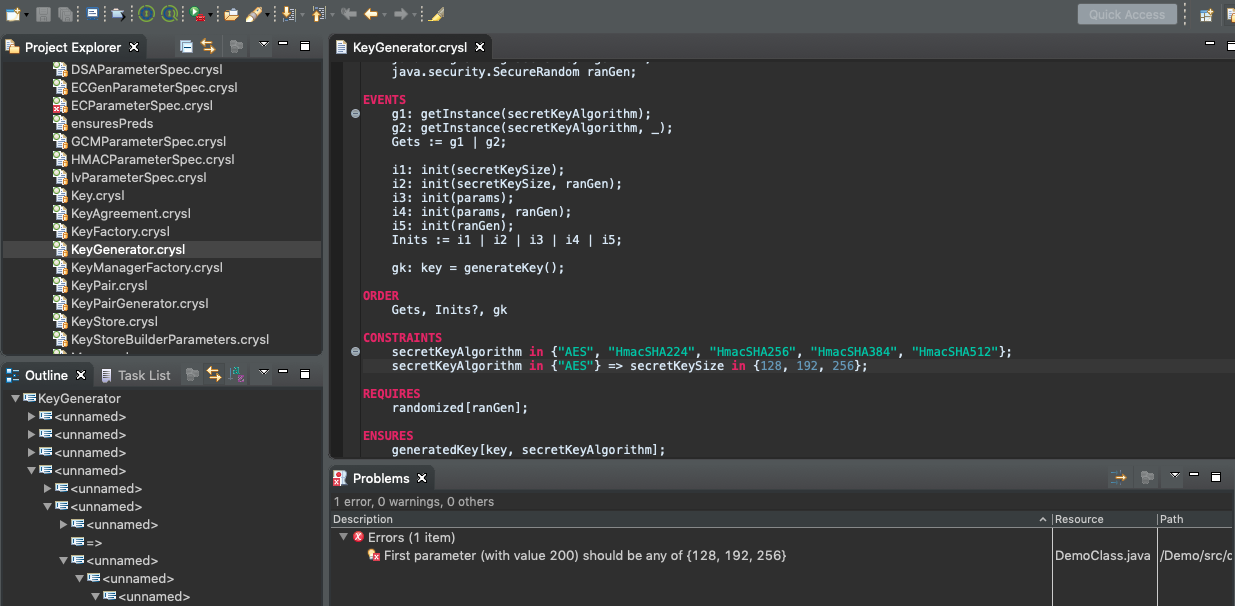The code snippet below show you how to use the JDK Security API to generate public and private keys. A private key can be use to sign a document and the public key is use to verify that the signature of the document is valid.
The JPA specification supports 4 different primary key generation strategies which generate the primary key values programmatically or use database features, like auto-incremented columns or sequences. Oct 26, 2016 Generating random numbers in Java; Which Java libraries are useful for competitive programming? HashMap getOrDefault(key, defaultValue) method in Java with Examples. How to set Precision for Double values in Java? This class is introduced in java 1.7 to generate random numbers of type integers, doubles, booleans etc. Below program. A Key pair generator for a particular algorithm creates a public/private key pair that can be used with this algorithm. It also associates algorithm-specific parameters with each of the generated keys. There are two ways to generate a key pair: in an algorithm-independent manner, and in an algorithm-specific manner.

The API we use to generate the key pairs is in the java.security package. That’s mean we have to import this package into our code. The class for generating the key pairs is KeyPairGenerator. To get an instance of this class we have to call the getInstance() methods by providing two parameters. The first parameter is algorithm and the second parameter is the provider.
After obtaining an instance of the key generator we have to initialize it. The initialize() method takes two parameters, the key size and a source of randomness. We set the key size to 1024 and pass and instance of SecureRandom.
Finally to generate the key pairs we call the generateKeyPair() method of the KeyPairGenerator class. This will return a KeyPair object from where we can get the PrivateKey and PublicKey by calling the getPrivate() and getPublic() method.
Let’s see the code snippet below:
- How do I backup MySQL databases in Ubuntu? - December 16, 2019
- How do I set the time of java.util.Date instance to 00:00:00? - October 24, 2019
- How to Install Consolas Font in Mac OS X? - March 29, 2019

getInstance factory methods (static methods that return instances of a given class). A Key pair generator for a particular algorithm creates a public/private key pair that can be used with this algorithm. It also associates algorithm-specific parameters with each of the generated keys.
There are two ways to generate a key pair: in an algorithm-independent manner, and in an algorithm-specific manner. The only difference between the two is the initialization of the object:
- Algorithm-Independent Initialization
All key pair generators share the concepts of a keysize and a source of randomness. The keysize is interpreted differently for different algorithms (e.g., in the case of the DSA algorithm, the keysize corresponds to the length of the modulus). There is an
initializemethod in this KeyPairGenerator class that takes these two universally shared types of arguments. There is also one that takes just akeysizeargument, and uses theSecureRandomimplementation of the highest-priority installed provider as the source of randomness. (If none of the installed providers supply an implementation ofSecureRandom, a system-provided source of randomness is used.)Since no other parameters are specified when you call the above algorithm-independent
initializeGameboy advance emulator mac download. methods, it is up to the provider what to do about the algorithm-specific parameters (if any) to be associated with each of the keys.If the algorithm is the DSA algorithm, and the keysize (modulus size) is 512, 768, or 1024, then the Sun provider uses a set of precomputed values for the
p,q, andgparameters. If the modulus size is not one of the above values, the Sun provider creates a new set of parameters. Other providers might have precomputed parameter sets for more than just the three modulus sizes mentioned above. Still others might not have a list of precomputed parameters at all and instead always create new parameter sets. - Algorithm-Specific Initialization
For situations where a set of algorithm-specific parameters already exists (e.g., so-called community parameters in DSA), there are two
initializemethods that have anAlgorithmParameterSpecargument. One also has aSecureRandomargument, while the the other uses theSecureRandomimplementation of the highest-priority installed provider as the source of randomness. (If none of the installed providers supply an implementation ofSecureRandom, a system-provided source of randomness is used.)
Generator For Keys And Values Java Book
In case the client does not explicitly initialize the KeyPairGenerator (via a call to an initialize method), each provider must supply (and document) a default initialization. For example, the Sun provider uses a default modulus size (keysize) of 1024 bits.
Note that this class is abstract and extends from KeyPairGeneratorSpi for historical reasons. Application developers should only take notice of the methods defined in this KeyPairGenerator class; all the methods in the superclass are intended for cryptographic service providers who wish to supply their own implementations of key pair generators.
Every implementation of the Java platform is required to support the following standard KeyPairGenerator algorithms and keysizes in parentheses:
DiffieHellman(1024)DSA(1024)RSA(1024, 2048)